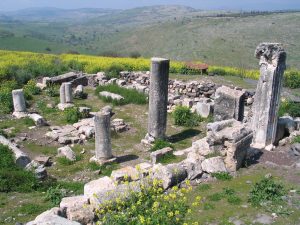If you are a Mrs. and you are a Christian, you are twice married and, assuming your husband is still living, there’s a sense in which you have two husbands. I hope, for Mrs. Colley, the sentiments below are always true of both my relationship to my husband and that to my Lord. When those who are in a covenant relationship with God become unfaithful to the vow made at baptism, they are referred to as spiritual adulterers in both testaments:
She saw that for all the adulteries of that faithless one, Israel, I had sent her away with a decree of divorce. Yet her treacherous sister Judah did not fear, but she too went and played the whore. Jeremiah 3:8.
You adulterous people![c] Do you not know that friendship with the world is enmity with God? Therefore whoever wishes to be a friend of the world makes himself an enemy of God. James 4:4
Many have posited that God is so hurt by spiritual adultery that He empathetically gives us the right to remarry in case of a spouse’s adultery (Matthew 19:9). He wants us to be able to recover and find comfort after the infidelity of a spouse. He knows how that feels.
But it could be true that one of the reasons marital unfaithfulness is the only acceptable scenario for remarriage is that God wanted to magnify this sin in our minds. Perhaps he wanted mankind to know how much we hurt Him when we place the things of this world–sin–in the position we once gave to God.
Or maybe it’s both. I do know this: As I occasionally speak with innocent parties, in marriages in the body of Christ, in which adultery has taken the trust, I’m left with the indisputable knowledge that the hurt is deeper than any I see in other scenarios of sin.
And yet there is forgiveness. If I’ve learned any thing from observation about the sin of marital infidelity, it’s that it’s possible to repent, gain forgiveness and put a marriage back on a fast track to happiness. Sometimes, righted early on, it’s possible to do this without damaging children, without hurting the influence of the local church, and without the eternal loss of souls. And God’s teaching us there, too. There’s time now, to right relationships with God in heaven. If you’ve walked away from the One who loves you supremely, you’ll never find that perfect love in anything the world has to offer. But, as time passes, it’s harder to undo the damage. Influence for heaven is lost. Lives are hurt. Sin complicates relationships and, most of all, it weakens your own spiritual resolve to be faithful. Don’t wait. Come back to the One who loved you first and best.
Espoused to One Husband
II Corinthians 11:2
If I love You, I’ll believe You
Though what You’ve pledged is far away.
What You say about tomorrow
Is what’s real for me today.If I love You, then I long
To hear Your strong, assuring voice.
I will trust You with my secrets;
Honor You in every choice.If I love You, I’ll defend You
When others ridicule Your name.
If all the world denies You, still
I’ll count but loss the shame.If I love You, I will be there
Whenever You’re expecting me.
I will love whatever You love.
Where You are, I’ll long to be.If I love You, I will trust You.
All my hopes on You rely.
But should faith and hope be passing,
Love abides to never die!
 Visiting Mount Arbel includes a look at the ruins of an ancient Jewish Synagogue. There are four Jewish villages on the mountain. But the most spectacular thing about the mountain is not what you see there, but what you see from there. The mountain has a beautiful view of Tiberius and of the Sea of Tiberius (also called the Sea of Galilee), where my Lord carried out the ministry that would change the world and would rescue you and me from Hell.
Visiting Mount Arbel includes a look at the ruins of an ancient Jewish Synagogue. There are four Jewish villages on the mountain. But the most spectacular thing about the mountain is not what you see there, but what you see from there. The mountain has a beautiful view of Tiberius and of the Sea of Tiberius (also called the Sea of Galilee), where my Lord carried out the ministry that would change the world and would rescue you and me from Hell. As my friend, Carla Moore, wrote in her article for Christian Woman magazine entitled He is Still Here:
As my friend, Carla Moore, wrote in her article for Christian Woman magazine entitled He is Still Here: